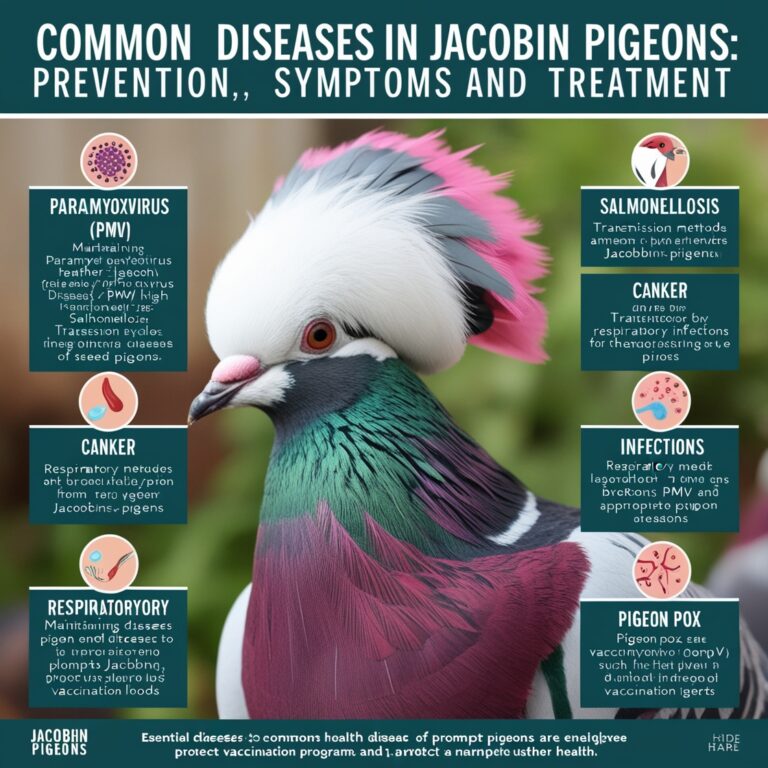Enrichment for Pet Pigeons
Safe Toys and Enrichment for Pet Pigeons
Enrichment for Pet Pigeons Providing your pet pigeon with safe toys and enrichment is vital for their mental and physical well-being. Enrichment activities can help to stimulate their natural behaviors, reduce stress, and prevent boredom. Just like other pets, pigeons need a stimulating environment that encourages exploration and exercise. In this article, we will explore the types of toys and enrichment activities that are safe and beneficial for pigeons, and how you can ensure that your pet pigeon stays happy and healthy.
Why Enrichment is Important for Pigeons
Pigeons are intelligent and social birds that require more than just food and water to thrive. Enrichment provides them with opportunities to engage in natural behaviors such as foraging, flying, and socializing. When pigeons are left in a barren environment without proper stimulation, they may develop negative behaviors like feather plucking, aggression, or lethargy. Enrichment helps prevent these issues by keeping your pigeon’s mind active and body fit.
Additionally, enrichment helps to reduce stress and anxiety, especially in domesticated pigeons that are confined to cages. Creating an environment that mimics the challenges and variety they would encounter in the wild ensures your pigeon stays emotionally balanced and healthy.
Types of Enrichment for Pet Pigeons
- Foraging Toys In the wild, pigeons spend a considerable amount of time searching for food. Foraging toys are an excellent way to simulate this natural behavior. You can use puzzle feeders, treat balls, or hide small treats in their environment for your pigeon to find. This keeps them mentally stimulated and can also slow down their eating, promoting better digestion and preventing overeating.
- Perches and Platforms A variety of perches and platforms are important for a pigeon’s physical health. These allow the bird to exercise its feet and wings and prevent boredom. Different types of perches, such as wood, rope, or natural tree branches, help to keep your pigeon’s feet healthy by providing varying textures. Platforms give them spaces to rest and observe their environment, which is essential for their comfort.
- Climbing Toys Pigeons enjoy climbing and exploring their surroundings. Toys such as ladders, ropes, and swings are perfect for encouraging physical activity. These toys should be sturdy and made from safe, non-toxic materials to prevent injury. Climbing helps pigeons strengthen their legs and wings and provides an outlet for their energy.
- Shredding and Chewing Toys Pigeons have a natural urge to peck and shred materials. Safe shredding toys, such as paper, cardboard, or bird-safe wicker toys, can satisfy this instinct. Providing safe materials for chewing and tearing can prevent them from engaging in destructive behaviors such as damaging their cage or their feathers. Just ensure that the materials are non-toxic and free from harmful chemicals.
- Mirrors and Reflective Toys Pigeons are curious about their reflections. Mirrors or shiny objects can provide entertainment, as your pigeon may interact with its reflection. However, be mindful that some pigeons can become overly attached to their reflection or agitated by it, so monitor their behavior to ensure it remains a positive form of enrichment.
- Interactive Time with the Owner Spending time with your pigeon is one of the most enriching activities you can provide. Pigeons are social birds that thrive on interaction, so offering them time outside of their cage, allowing them to perch on your hand or shoulder, and speaking softly to them all enhance their sense of companionship. Training your pigeon to perform simple tricks or tasks can also provide mental stimulation and strengthen your bond.
Ensuring Toy Safety
When selecting toys for your pigeon, safety should always be a top priority. Not all toys made for birds are suitable for pigeons, so it’s essential to choose those that won’t pose a risk of injury or toxicity. Here are some important factors to consider:
- Non-Toxic Materials Ensure that the toys are made from non-toxic materials like natural wood, untreated paper, or food-grade plastic. Avoid toys that contain lead, zinc, or other harmful metals, as pigeons may chew on these materials, leading to poisoning.
- Appropriate Size Toys should be the right size for your pigeon. Avoid small toys that can be swallowed or have parts that can become lodged in their beak or throat. Large, sturdy toys that can withstand pecking and chewing are ideal for pigeons.
- No Loose Threads Toys made of fabric or rope should not have loose threads, as pigeons can become entangled, leading to injury or strangulation. Regularly inspect toys to ensure they remain in good condition and remove them if they start to fray or come apart.
- Avoid Sharp Edges Any toy you provide should be free of sharp edges or rough surfaces that could cut your pigeon’s delicate feet, beak, or feathers. Smooth, rounded edges are safer for their playful beaks and claws.
- Regular Cleaning Toys and perches should be cleaned regularly to prevent the buildup of bacteria or mold. Use bird-safe cleaning products and avoid harsh chemicals that could leave harmful residues. Toys should also be rotated to keep things interesting and reduce the risk of boredom.
Creating a Stimulating Environment
In addition to toys, creating an overall stimulating environment for your pigeon is important. Here are a few more ideas to enrich your pigeon’s living space:
- Varied Cage Layout: Change the layout of your pigeon’s cage periodically by moving toys, perches, and feeders around. This encourages exploration and keeps their environment dynamic.
- Outdoor Time (Supervised): If possible, allow your pigeon some supervised outdoor time in a safe and enclosed space. This provides fresh air, sunlight, and a chance to engage in natural behaviors like foraging and flying.
- Social Interaction: If you have more than one pigeon, they can interact with each other, providing a natural form of social enrichment. However, be mindful of introducing new birds carefully to avoid aggression.
The Role of Enrichment in Health and Well-Being
Providing safe toys and enrichment is not just about keeping your pigeon entertained. It plays a significant role in their physical health, mental well-being, and longevity. Enrichment activities encourage exercise, which is essential for maintaining a healthy weight and preventing obesity-related issues. Mentally stimulating activities also help prevent stress, anxiety, and depression in pigeons. Additionally, enrichment helps to curb undesirable behaviors, such as feather plucking or aggression, that can arise when a pigeon is bored or understimulated. By offering a variety of toys and activities, you help keep your pigeon engaged and content, leading to a happier and healthier life. Enrichment plays a critical role in the overall health and well-being of pet pigeons. It’s not just about keeping the bird busy but contributes to their physical fitness, mental stimulation, and longevity. Providing safe toys and activities can lead to better physical health by promoting exercise, which helps prevent issues like obesity. Physical activity is important for maintaining muscle tone, joint flexibility, and a healthy weight, which in turn helps prevent various health problems, including heart issues or mobility concerns. Mentally, enrichment is crucial for reducing stress and anxiety. Pigeons, like many intelligent animals, need mental challenges to stay engaged and avoid feelings of boredom. Without enough stimulation, pigeons may develop negative behaviors like feather plucking, aggression, or apathy. These behaviors are often signs of frustration or mental fatigue, which can have long-term effects on their well-being. Engaging a pigeon in different activities—whether through foraging toys, interactive play, or social interaction—keeps their mind active, which can reduce the likelihood of stress-related health issues. For example, birds that are consistently enriched tend to show more curiosity, alertness, and better social behavior, contributing to a more fulfilling and happy life. Overall, enrichment is essential for curbing undesirable habits, maintaining both physical and mental health, and creating a positive and interactive environment for pigeons. By continuously offering varied and safe enrichment activities, you are ensuring your pet remains not only entertained but physically and emotionally healthy.
Conclusion
Creating a safe and enriching environment for your pet pigeon is key to their well-being. By providing appropriate toys, promoting physical activity, and engaging in regular interaction, you foster a stronger bond with your pigeon and ensure their mental and physical health. Whether it’s through foraging, climbing, or spending time with you, your pigeon will benefit from the enrichment activities you provide, leading to a long, happy, and fulfilling relationship with your feathered friend.








